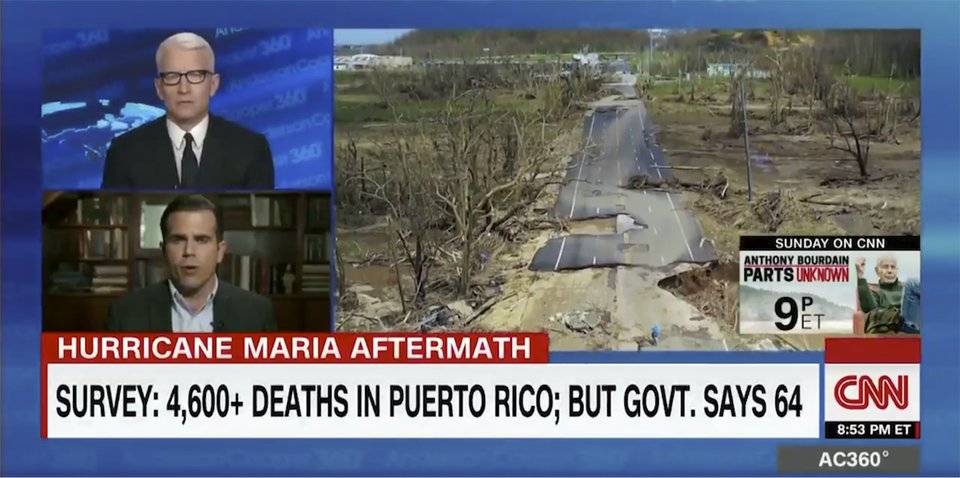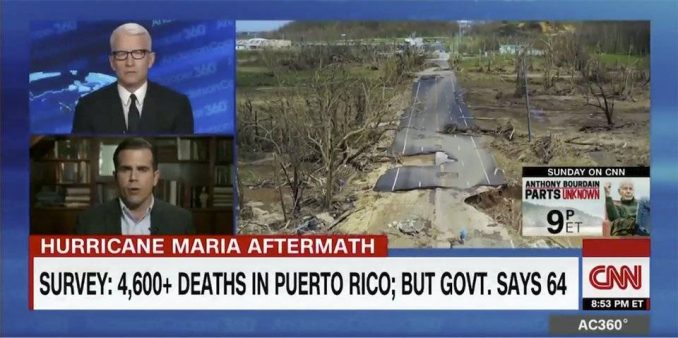



This time they will be counted. No longer can the deaths of so many be ignored by both the Puerto Rican and U.S. authorities, who still insist on a mere 64 killed by the storm.
A revealing Harvard study titled “Mortality in Puerto Rico after Hurricane Maria,” published on May 29 in the New England Journal of Medicine, has shredded the official figure. Based on more than 3,000 surveys of households throughout the archipelago, it concluded that between Sept. 20 and Dec. 31 of last year, at least 4,645 people died, either directly because of the hurricane or indirectly because of delayed or interrupted health care. That number could easily double, since people continue to die from lack of electricity to run life-support machines, as well as from suicides, lack of appropriate health care services and other storm-related causes.
Immediately after publication of the Harvard report, Puerto Rican activists formed Project 4645. Through social media, it called on people to bring to the Capitol shoes of those they knew had died as a result of Maria, in order to validate the study’s numbers. It was a strong rebuttal to the Ricky Roselló government’s refusal to publish the death statistics.
Since February, local organizations have been trying to get information about the hurricane casualties. The Puerto Rican Center for Investigative Journalism filed a suit charging the PR government’s Bureau of Vital Statistics and the Health Department with concealing the statistics. So far, there has been no response. These government agencies also refused to give any data to the Harvard study.
This neglect of a people by both San Juan and Washington is not accidental. We now know that Hurricane Maria was even more deadly than Hurricane Katrina. Yet these deaths are not officially counted, showing not only insensitivity but also deliberate plans to negate the existence of the Puerto Rican nation. This clearly exposes the genocidal intent behind the restructuring plans for the colony, a territory that “belongs to, but is not part of” the United States, said a 2016 U.S. Supreme Court ruling in the Sanchez Valle case.
Even more than the real number of casualties, this event begins to pull back the curtain of lies and deception imposed on the people of PR, with fake reasons given for the privatization of essential services, the closing of schools and the elimination of workers’ rights. The planned pauperization and enslavement of the people proceeds as both a creole and a foreign elite enrich themselves, their armies of law firms and consultants sucking up multimillion-dollar salaries. The imperialist capitalists and their allies on the island scheme to extract even more wealth from a supposed $74 billion public debt they created, even as they refuse to allow an independent audit.
One of these deceptive moves came in February with the governor signing a contract with George Washington University. After several U.S. media reported that the hurricane had caused more than 1,000 deaths, Roselló was forced to deal with the number of casualties. Instead of hiring experts from local Puerto Rican universities, both public and private, well versed on the issue, he paid $305,000 of public money — which could increase to $1 million — to the Milken Institute of Public Health at George Washington University to determine the death toll.
Why this university? Roselló’s father, Pedro Roselló, who was governor from 1993 through 2000, was an associate professor at GWU in 2002-03. Even more relevant is Julia Keleher, who was chosen by Roselló to be PR’s secretary of education, but who is called “the mercenary of education” in PR. Keleher is a Philadelphia native completely ignorant of Puerto Rican history, culture and the traditions of the children under her mandate. Yet she is designing a new education model for Puerto Rican children, while closing schools and privatizing public education. Keleher is an adjunct faculty member at GWU’s School of Business and a technical trainer there for Management Concepts, specializing in project management.
The GWU study, scheduled for release in May, has yet to come out.
Crimes against workers
While the death count captures headlines, another crime against Puerto Rico’s workers is unfolding. Much is being said about the so-called “power struggle” between the governor and the Fiscal Control Board imposed by the U.S. Congress. But whatever minute differences may exist between them, there is no possibility this struggle can benefit the PR population. Both have the same goal: the sacrifice of the Puerto Rican working class on the altar of capitalist profits.
Since its inception, the FCB has tried to impose enormous austerity measures through a fiscal plan that includes “labor flexibility,” “employment at will,” huge increases in tuition at the public University of Puerto Rico, the closing of several campuses and schools, eliminating many workers’ benefits — including holidays, sick days and Christmas bonuses — and reducing pensions, plus other measures that deal a severe blow to the working class, still suffering from the devastating effects of the 2006 PR recession.
However, the FCB has no power to enact the laws required to change current workers’ guarantees. So the governor, who has been submissive to the junta’s demands, has readily sent legal initiatives to the legislature where they are approved.
At the end of May, the elimination of Law 80 was one such blow. This law had protected private sector workers from unjustified firing. After much posturing by the governor, who said he would never allow such an attack on Puerto Rican workers, Roselló finally gave in when the FCB offered to increase the budget for Fortaleza, the governor’s residence, from $15 to $43 million!
What is happening to workers in Puerto Rico is just the latest chapter in the capitalist system’s criminal attack. Having reached a dead end, capitalism tries to eliminate any barriers to its quest for ever higher profits. Because PR is a colony of the U.S., the capitalists think they can abolish workers’ rights there.
But history has not ended. The communities in PR are organizing, now certain that they cannot count on the government to defend them. This awareness is happening while many organizations and unions file suits against the PROMESA law that restructured Puerto Rico’s debt in violation of the U.S. and Puerto Rican constitutions. Several of these suits challenge PR’s colonial status which, since the 2016 ruling in the Sanchez Valle case, is being questioned as never before.
Karl Marx said that it is not the consciousness of people that determines their being but their social being that determines their consciousness. In Puerto Rico, the social conditions are bringing this more and more to mind. The real possibility of a jump in consciousness is being felt in many ways.
The struggle, both in the streets and in the courts, promises that this summer will be a very hot one in the archipelago.
Victory to the Puerto Rican workers! Free Puerto Rico!
Philadelphia On March 26, the Pennsylvania Supreme Court denied political prisoner Mumia Abu-Jamal permission to…
There are two important and overlapping holidays on April 22: Earth Day and Vladimir Lenin’s…
Twelve people were arrested April 9 for blocking traffic to Travis Air Force Base, a…
Secretary-General of Hezbollah Sheikh Naim Qassem delivered a speech on April 18, 2025. Resistance News…
Anakbayan Philadelphia held a rally on April 19 to demand the U.S. end its military…
Boston, April 20, 2025 The leadership of the Democratic Party nationally and especially in Massachusetts…